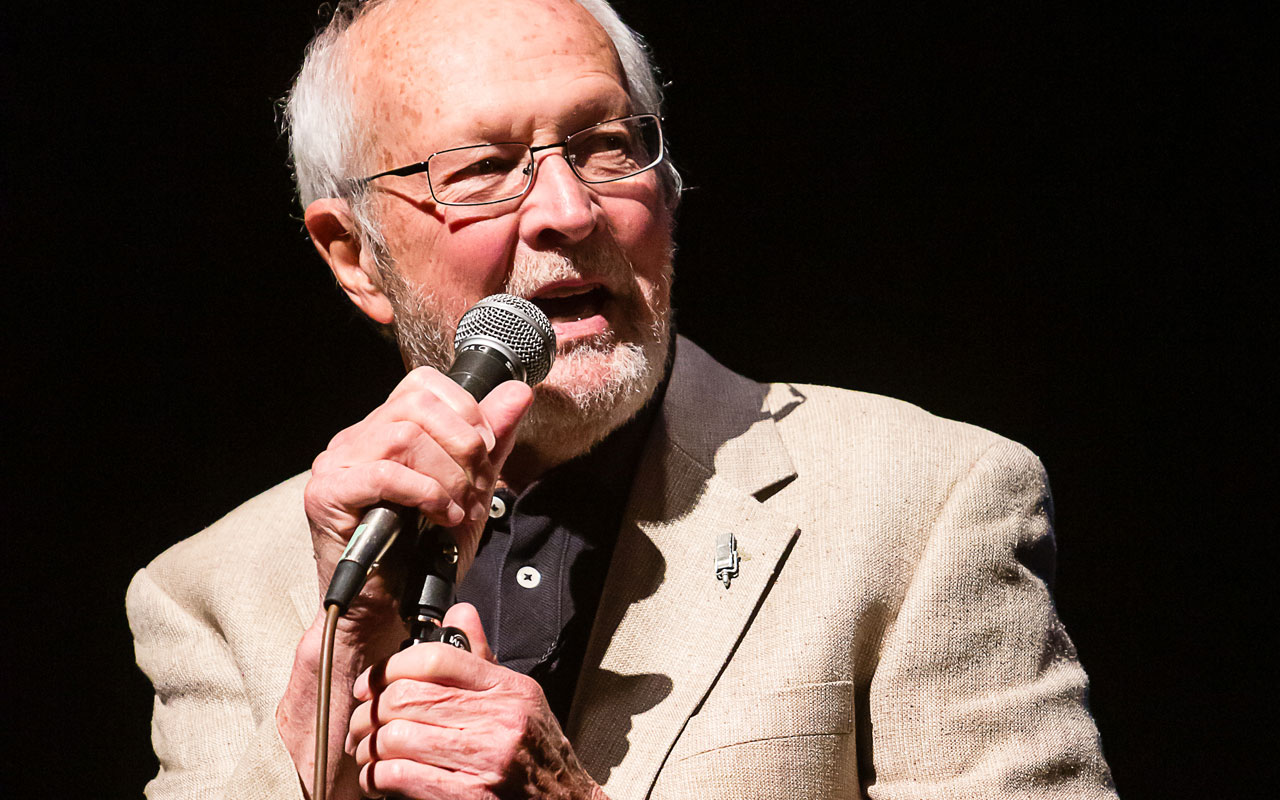
Jim Wilke photo by Lisa Hagen Glynn
Earshot Jazz is proud to share brief excerpts from the forthcoming book, After Jackson Street: Seattle Jazz in the Modern Era (History Press of Charleston, S.C.), by Seattle’s preeminent jazz writer, Paul de Barros. Picking up where Jackson Street After Hours (Sasquatch Books, 1993) left off, the new book will feature fascinating interviews with the familiar artists and under-sung heroes who shape this vibrant jazz scene.
It’s difficult to think of anyone who has contributed more to Seattle jazz than Jim Wilke. A jazz radio host here since 1961, Wilke co-founded the Seattle Jazz Society, booked the Bellevue Jazz Festival and Seattle Department of Parks and Recreation concerts, and the club shows for Jazz Port Townsend. He taught jazz history at Cornish College and Bellevue College (where he also taught broadcasting) and today, his historic ‘60s recordings from the Penthouse are being devoured by a hungry audience.
But Wilke’s Jazz Northwest show on KNKX may stand as his most influential contribution. Broadcast since 1988, Jazz Northwest features live recordings of regional musicians who might not otherwise be heard. Sadly, Wilke broadcasted his last edition of the show on August 27. (Saxophonist Kareem Kandi will continue the show.) In these brief, edited excerpts from our “Roots” interview, Wilke, 86, talked about the genesis of Jazz Northwest and how he came to Seattle from his home state of Iowa.
My sister Mary lived in Seattle. I came out to visit her between high school and college [in 1954]. She and her husband Oliver took us for a drive down to Lake Quinault. There’s a nice little nature loop trail there. For a boy from Iowa, this was mind-blowing, all these big ferns and moss, and nobody watering it, you know, it just grew – nurse logs, and trees growing out of dead trees and so on. And the thing that really hit me was, I could breathe so deeply. I’d had asthma and hay fever in Iowa. To be in that oxygen-rich atmosphere was thrilling, exciting, invigorating. And so, I kind of decided I would like to go out to that area if I could when I graduated. With the income level and the educational level of the general populace, I thought it would be a good place to run a classical music station.
But nothing developed when I came back [in 1959]. I had a lead on a couple of jobs in Sacramento and San Francisco, so I had to go down there first and got offered a job at a small station in Sacramento, KJML. I was there for a couple of years, and I managed to weasel in a jazz show. But the station was not doing too well, and I had an opportunity to come back to Seattle [in 1961]. Dan Shannon was at [classical music station] KING-FM, and when he heard I was back in town, he said I’ve got a plan, and I’m going to talk to Mrs. B about it [the late Kay Bullitt, who owned the station]. You are the guy I want to have as my sideman, and if they won’t hire you, I’m quitting. Wow. And so I got hired, and Dan and I ran the station together.
I put in a jazz strip at 11 o’clock at night, when the classical audience was going to bed. I said, you know, maybe if we put a jazz strip in there, it might attract an exclusive audience and bring our audience numbers back up a little bit, which it did. And that became Jazz Till Midnight. Then later it moved to after midnight and became Jazz After Hours. And that’s where I first used the name Jazz After Hours during that period at KING.One of the reasons why I started doing Jazz Northwest [at KNKX, then KPLU] was I felt there were a lot of good players who weren’t getting much airplay because they didn’t have records. So I went out to record them and put those tapes on the air and gave local musicians some exposure that way. I think, indirectly, it encouraged musicians to produce their own recordings around here. And then, with the birth and growth of Origin Records, which was a tremendous boon for the community, because they made it a point to record mostly Northwest musicians, maybe we got to a point where these kind of onsite live recordings weren’t needed as much.